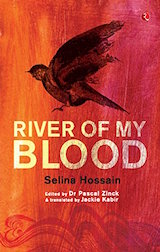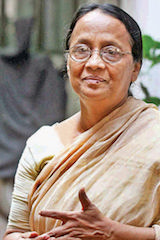River of My Blood
Selina Hossain
|
The book ‘River of my Blood’ is divided into ten chapters, each named after the months in Bangla. The story starts in the month of Kartik and on the first page we have rich symbolisms of the colour red; it signifies birth and life; it is the colour of riots and the 1971 war. It is also the colour of her earliest memories. Red signaled her transforming to a woman from a girl and the colour red heralded a new life into her world, her baby. At the end of the novel after her son is shot Nita remarks that Rais had changed to a blood lotus. I see it as the symbol of an ever-lasting victory. The final sentence of the novel as Boori lay dying, is ‘Everything turned Red.’ The title of the book is ‘River of my Blood’- red is the colour of war, of destruction, of death, yet it is the colour of hope, of freedom, of life. The protagonist is named Boori, the youngest of twelve children. Her childhood was filled with the joys of village life – enjoying nature, playing with other children, being loved by her family and everything about Haldi, her village, pleased and fulfilled her. Some referred to her as the village tomboy but her vivacious enthusiasm for life easily endears her to us. When her father died she was married off to a much older widower named Gafoor. Being poor and fatherless her brother thought that she would not find a better husband, but she learned to be happy in her new status of being married. Gafoor had two sons, Salim and Kalim and although they were much younger than her, they were often her playmates before she became their step-mother. Her husband doted on her and theirs was a peaceful existence but soon she yearned for a child of her own. It is at this part in the story that the writer describes to us the religious and cultural customs in our society of seeking divine help by placating saints (pirs and babas) by visiting their shrines and making monetary offerings in specifically devised ways. In this case she was advised by her friend Nita Bairagi and others to visit the shrine of Kesa Baba during the Poush Mela in Srinile Dham. It is thought that by hanging a pouch of five annas to a neem tree near his shrine a faithful devotee may have his or her prayers answered. The description of the mela itself is rich with words and phrases like ‘fire eaters on stilts’, ‘khelnapheriwala’,’ kaporerputul’, wooden toys, spinning tops and plenty of home made food. Whether it was the saint’s intervention or not, Boori was pregnant after six years of marriage. In the second chapter of the book ‘Agrahayan’ we are introduced to one of the most memorable characters in the novel, Nita Bairagi. The image of this Baul minstrel wandering the villages and singing to the tune of her dotara gives a poetic sublimity to the novel. The Bauls’ unconventional, gypsy life style is portrayed very successfully in the book. They wander the countryside in their saffron robes and depend on the generosity of fellow human beings for food. Their religion is the religion of love and humanity. Fascinating is the ‘monermanush’ or companion each Baul has. Nita and her ‘monermanush’ Choron Das have years of a happy companionship, but both move on to other soul mates. We may feel sad when one soul mate is rejected for another, but permanence of any kind is known by the Bauls not to last. The only permanence we should seek is to be better human beings. And to achieve this we must renounce material wealth and serve and love our fellow humans. Nita Bairagi is a sincere friend and totally selfless. When at the end of the novel the ashram for wounded Muktijoddhas is burned down by the Razakars we cannot help but realize that the Bairagis’ contribution to our liberation was by no means a humble one. And of-course the action of the Razakars was typically base and inhuman. Boori’s own baby gave her much joy and happiness even though Rais was a mute baby. She loved him with all her heart and put him on a pedestal, loving him extra for his disability. Village superstitions are often mentioned in a few places in the novel. For example it was commented by other villagers that as a child she wandered the countryside too freely and hence she was exposed to the influence of evil spirits which caused her to have a physically challenged child. It is interesting how well she takes to her two step sons Salim and Kalim. She nurtures them as her own and gets Salim married to a virtuous girl named Ramija. She finds happiness and contentment in her world consisting of husband, two step-sons, her own son and daughter-in-law. But often she remembers Jalil, her childhood love. The remaining half of the book is about the events that led up to the 1971 war of liberation. Her husband Gafoor dies of old age despite the herbal treatments, incantations suggested by the Baul fakir and the ‘tabij’ to ward off the djinns. After Gafoor’s death Boori does not give up and simply accept her sad fate. She bravely faces the challenge of steering her family to a good future. Although she received minimal education in her village school, with her innate curiosity and keenness to understand her world, she understands the reasons and sentiments behind wanting a free country, free from the domination of Pakistan. Despite her concerns for Salim’s safety she understands that his desire to be a muktijoddha is an aspiration of unsurpassed glory. She is proud of him. With the threat of killings and destruction on a daily basis she looks after the welfare of all the villagers of Haldi specially those who have joined the war. From the nearby Pakistan army camp she can hear the screams of tortured Bengali men and the blood-curdling groans of the village girls and women being raped and often killed by the Pakistani soldiers. Her son Salim is being hunted down by the Pakistan army so she is intelligent enough to advise Romija, her daughter-in-law to live with her father. Just as she feared, her other son Kalim is taken away by the Pakistan army and tortured to elicit information from him of his Muktijoddha brother . They even bring the severely tortured Kalim to her home and torture him in front of her. The mother in her is torn to shreds at the sight. She rushed to the nearest soldier and clung to his boot to spare Kalim’s life but before dying Kalim called out to her ‘Oh Maa! Please don’t beg them for my life.’ ‘ Please don’t fall at their feet. Thousands of Bengalis are dying. If you fall at their feet , you will dishonour those who gave their lives for our country.’ Hearing this an almost unreal strength is born of her. She feels the pride of a mother whose sons never gave in to a moment’s cowardice. He is shot in her presence. But the victory was her’s and her son’s. Her son had just given his life for his motherland, an act that has no parallel. The changed Boori who wandered the village lanes in Haldi as a child and never had a worry in her life is now the lofty individual, fired with patriotism and the spirit of extreme sacrifice for her country. A final test of how elevated in character and spirit she is, is when, to protect two Mukti Bahini fighters, she hides them in an urn in her home when they are chased by Pakistani soldiers. She places a gun in her beloved son Rais’ hand and pushes him towards them so that they think he is one of the freedom fighters. The Pakistani soldiers thank her for her loyalty to Pakistan and take him away to shoot him in her own backyard. Kader and Hakim, the Muktijoddhas she had been hiding asked her why she sacrifices her own son who she loved so much, for them. She saw the tears in their eyes and remarked ‘the Mukti Bahini don’t want cry- babies’. ‘If you don’t run off right now, Rais will have died for nothing. Go! Go!’ These are the words that ring in the reader’s ears long after reading them. The author has given us an example of the splendour of patriotism, moral strength and courage. Boori is an example of an every day woman who transcends to a higher being by her act of supreme sacrifice. It is perhaps a braver thing to do when you sacrifice your child’s life rather than your own. It is as noble as the sacrifice Sydney Carton made of his own life in Charles Dickens’ ‘A Tale of Two Cities’. He chooses to die in the place of his love Lucie Manette and we all remember how the sacrifice was immortalized in the words ‘It is a far far better thing that I do than I have ever done; it is a far far better rest I go to than I have ever known.’ I would like to add a word about the translation. There is an extensive glossary of Bangla words translated to English at the end of the novel. I appreciate and prefer the fact that many of the Bangla words have been used in the novel which can also be understood by non-Bangla speaking readers. Another added flavour of Bengal is the Bangla script used along with the English name for the month that each chapter is headed under. Rural Bengal’s birds, trees and foods have been described in detail to create the setting of a typical village of Bengal. The superstitions and village gossip, the melas and religious beliefs all make up the complexities of an apparently simple rural existence. An important element in the book which I find unique and praise-worthy are the Baul, Jari and patriotic songs which are interspersed throughout the novel. Poetry and song always add colour and reveal the essence of what is being expressed more clearly and the appropriateness of each song in the story is a commendable achievement by the author. My personal favourites are the Baul songs which convey wise philosophies and ask questions of life’s true meaning. There are also a few simple folk songs that reflect the serenity of life in our villages before they were plundered and attacked. Patriotic songs such as ‘Amar Bhaiyer Rokte Rangano’ and our national anthem have been infused into the novel to enable Boori to understand life’s higher purpose. They are infused to enable Boori to build her feeling of patriotism and also to convey to us readers that the ideals suggested by these songs should be the guiding principle of all our lives. The novel is about struggle and oppression, of Beautiful Bangladesh and its people and a homage to those whose drops of blood formed the river which flowed silently but surely till the birth of a new nation when we gained independence and victory on 16th December, 1971. Nusrat Haq | 6 June 2016 | The Daily Star
|

 Paperback: 224 pages
Paperback: 224 pages Selina Hossain
Selina Hossain